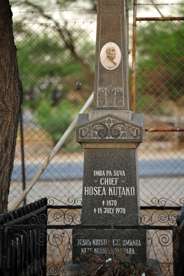Hosea Kutako

Chief Hosea Komombumbi Kutako (born 1870 at Okahurimehi near Kalkfeld, died 18 July 1970 in the Aminuis Reserve)[1] was an early Namibian nationalist leader and a founder member of Namibia's first nationalist party, the South West African National Union (SWANU). Kutako, alongside the British Anglican priest Rev. Michael Scott, submitted numerous petitions to the United Nations during the 1950s and 1960s calling on the world body to end South African rule and grant Namibia independence. This eventually led to the UN's recognition of Namibia as a sovereign country under colonial administration by South Africa and the historic 1971 advisory opinion of the International Court of Justice that South Africa's continued administration of Namibia was illegal in terms of international law. Hosea Kutako is considered a national hero in Namibia.
In 1920, Hosea Kutako was officially appointed as leader of the Herero by Frederik Maharero. Frederik had been empowered to transfer power by his father, Herero chief Samuel Maharero, who had been exiled after the Herero War and was since banned from entering the country by the South African Mandatory Administration. Hosea Kutako took over his role as a commitment to preserve the memory of the glorious times of the Herero before and during the German colonisation as well as of the atrocities in the battle of Waterberg. The seat of his chieftaincy was situated at the settlement of Toasis in the Aminuis area.[2]
Already in 1920, he founded the Green Flags, an association to keep up tradition, and went on by founding the Red Flags in 1923, after Samuel Maharero’s death. Kutako prompted and organised the transfer of Samuel Maharero’s body and its funeral on Okahandja next to the grave of Jonker Afrikaner. Kutako also founded the Truppenspieler association. It was meant to get military importance which was opposed both by the South African authorities and by Sam Nujoma, the co-founder of the South West African People's Organisation SWAPO. So, the Truppenspieler had to content themselves with an accompanying role at Herero Day. Along with Nujoma, Hosea Kutako founded the South West African National Union (SWANU) in 1959, an organisation that was to merge into SWAPO a year later. It later re-emerged as a separate political entity.
Recognition
Hosea Kutako is one of nine national heroes of Namibia that were identified at the inauguration of the country's Heroes' Acre near Windhoek. Founding president Sam Nujoma remarked in his inauguration speech on 26 August 2002 that:
Chief Hosea Komombumbi Kutako [...] participated on the anti colonial wars of 1904 as one of the leading commanders. He also played an historic and significant role in petitioning the United Nations Organisation demanding the placement of the then South West Africa under the United Nations trusteeship system. [...] In this way, he played a major role in Namibia's struggle for freedom and independence. To his revolutionary spirit and his visionary memory we humbly offer our honor and respect.[3]
Kutako is honoured in form of a granite tombstone with his name engraved and his portrait plastered onto the slab.[3]
Windhoek's international airport, the country's primary international airport, is named after him. In July 2010, Kutako's former home in the Omaheke Region was nominated by the Omaheke Regional Council to become a national heritage site.[4]
References
- ↑ Dierks, Klaus. "Biographies of Namibian Personalities, K". klausdierks.com. Retrieved 14 January 2013.
- ↑ Matundu-Tjiparuro, Kae (14 January 2013). "Police implored to act against stock theft". New Era.
- 1 2 Nujoma, Sam (26 August 2002). "Heroes' Acre Namibia Opening Ceremony - inaugural speech". via namibia-1on1.com.
- ↑ Chief Kutako's house could become a heritage site New Era, 26 July 2010
External links
- Kutako's memory cast in bronze The Namibian, 12 June 1998
| Preceded by Samuel Maharero |
Paramount Chief of the Herero people 1917-1970 |
Succeeded by Clemens Kapuuo |
| Preceded by none |
Leader of Hereroland 1968-1970 |
Succeeded by Clemens Kapuuo |